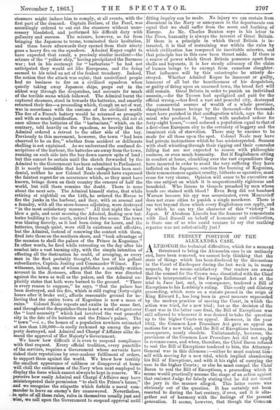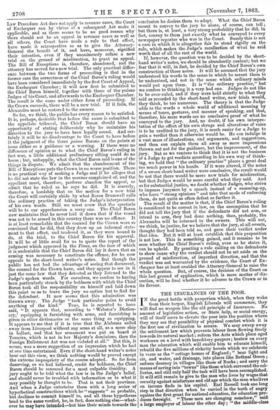THE PRESENT POSITION OF THE ALEXANDRA CASE.
ALTHOUGH the technical difficulties, which for a moment threatened to bring the Alexandra case to an untimely end, have been removed, we cannot help thinking that the state of things which has been disclosed by the discussions in the Court of Exchequer during the last week is, in many respects, by no means satisfactory Our readers are aware that the counsel for the Crown weir dissatisfied with the Chief Baron's interpretation of the Foreign Enlistment Act at the trial in June last, and, in consequence, tendered a Bill of Exceptions to his Lordship's ruling. This costly and dilatory proceeding, which rests on a statute passed in the reign of King Edward I., has long been in great measure superseded by the modern practice of moving the Court, in which the action was tried, for a new trial; but as the decision of the Court was in the latter case final, the Bill of Exceptions was still adhered to whenever it was desired to take the question up to the higher Courts on appeal. However, in the year 1852, the Common Law Procedure Act gave an appeal on motions for a new trial, and the Bill of Exceptions became, in consequence, nearly obsolete. Unfortunately, however, the provisions of the Common Law Procedure Act did not apply to revenue cases, and when, therefore, the Chief Baron refused to seal the Bill of Exceptions tendered to him, the Attorney- General was in this dilemma :—either he must content him- self with moving for a new trial, which implied abandoning his Bill of Exceptions, and with it his right of carrying the case to the higher Courts ; or else he must compel the Chief Baron to seal the Bill of Exceptions, a proceeding which it seems would practically assume the shape of an action against that eminent Judge for falsely stating that he did not direct the jury in the manner alleged. This latter course was obviously out of the question. It has certainly i not been i resorted to during the last century, if ever, and it is alto- gether out of harmony with the feelings of the present generation. It seems, however, that though the Common Law Procedure Act does not apply to revenue cases, the Court of Exchequer can by virtue of a subsequent Act make it applicable, and as there seems to be no good reason why there should not be an appeal in revenue cases as well as all others, the Court have made a rule to that effect, have made it retrospective so as to give the Attorney- General the benefit of it, and have, moreover, signified their intention, even if they unanimously refuse a new trial on the ground of misdirection, to grant an appeal. The Bill of Exceptions is, therefore, abandoned, and the attorney has moved for a new trial. The only practical differ- ence between the two forms of proceeding is that in the former ease the correctness of the Chief Baron's ruling would have been considered immediately by the first Court of Appeal, the Exchequer Chamber ; it will now first be submitted to the Chief Baron himself, together with three of the puisne Judges of his Court, and afterwards to the Exchequer Chamber. The result is the same under either form of proceeding. If the Crown succeeds, there will be a new trial. If it fails, the Alexandra must be restored to the owners.
So far, we think, the public has every reason to be satisfied. It is, perhaps, desirable that before the cause is submitted to the appellate tribunal, the Chief Baron should have an opportunity of stating deliberately why he maintains his direction to the jury to have been legally sound. And cer- tainly it will be no disadvantage to the Court to have before it the judgment of the three puisne Barons on the points at issue either as a guidance or a warning. If there were no difference of opinion as to what the Chief Baron's ruling in fact was, a little additional preliminary sifting could do no harm ; but, unhappily, what the Chief Baron said is one of the things in dispute. We admit that the abandonment of the Bill of Exceptions puts the Crown in no worse position. There is no practical way of making a Judge seal if he alleges that he did not state the law in the manner complained of, and the appellant must, therefore, perforce abandon the appeal, or admit that he ruled as he says he did. It is scarcely, therefore, a hardship that on the motion for a new trial the Court will certainly abide by what Baron Bramwell calls the ordinary practice of taking the Judge's interpretation of his own words. Still we must avow that the spectacle will be to our apprehension a sorry one. The Chief Baron now maintains that he never laid it down that if the vessel was not to be armed in this country there was no offence. It is at least remarkable that the counsel for the Crown were so convinced that he did, that they drew up an informal state- ment to that effect, and tendered it., as they were bound to do, at the trial, to the Chief Baron for his approval. It will be of little avail for us to quote the report of the judgment which appeared in the Times, on the face of which it is undeniable that the Chief Baron did lay it down that an arming was necessary to constitute the offence, for he now appeals to the short-hand writer's notes. But though the public has not had the advantage of seeing that document, the counsel for the Crown have, and they appear to see in it just the same law that they detected as they listened to the Judge's spoken words. For ourselves, we confess to having been particularly struck by the boldness with which the Chief Baron took all the responsibility on himself and laid down this point so as to leave the jury no option but to find 'for the defendant. It now seems that this admiration was thrown away. The Judge " took particular pains to avoid anything of the kind." True, he is reported to have said, " It appears that, according to Webster's Diction- ary,' equipping is furnishing with arms, and furnishing is given in other dictionaries as the same thing as equipping. It appears to me that if it is true that the Alabama sailed away from Liverpool without any arms at all, as a mere ship in ballast, and that her armament was put on board at Terceira, which is not in her Majesty's dominions, then the Foreign Enlistment Act was not violated at all." But this, it seems, was a mere suggestion of an impression which he had at one time entertained. Even if the short-hand writer's notes bear out this view, we think nothing would be proved except the extreme impropriety of the course adopted. So far from deserving, as we had believed, credit for boldness, the Chief Baron should be censured for a most culpable timidity. A jury ought to be told what the law is in the Judge's belief, and should never be troubled with information as to what it may possibly be thought to be. That is not their province. And when a Judge entertains them with a long series of hypothetical constructions which he " suggests" as probable, but declines to commit himself to, and all those hypotheses tend to the same verdict, he, in fact, does nothing else—what- ever he may have intended—but bias their minds towards the conclusion he desires them to adopt. What the Chief Baron meant to convey to the jury he alone, of course, can tell ; but there is, at least, a very strong probability that he did, in fact, convey to them just exactly what he conveyed to every newspaper reporter who was in the Court. Surely this is not a case in which it is altogether fair to stand rigidly on the rule, which makes the Judge's recollection of what he said worth that of all the rest of the world.
If, however, the question was to be decided by the short- hand writer's notes, we should be abundantly content; but we fear that it will, in fact, be decided by the Chief Baron's own construction of those notes. It will be assumed that the jury understood his words in the sense in which he meant them to be understood, and not in-the sense which ordinary minds would put upon them. It is "the ordinary practice," but we confess to thinking it a very bad one. Judges do not like to be over-ruled, and if they were held strictly to what they said as recorded by the short-hand writer, new trials would, they think, be too numerous. The theory is that the Judge adds to the words a whole world of additional meaning by means of tones, gestures, and manner of speaking, and that, therefore, his mere words are no conclusive proof of what he conveyed to the jury. And, no doubt, if his own interpre- tation of the effect of his own shrugs and alterations of voice is to be credited to the jury, it is much easier for a Judge to gain a verdict than it otherwise would be. He can indulge in a vast mass of illustrations, and arguments, and suggestions, and then can explain them all away as mere impressions thrown out not for the guidance, but the improvement, of the jury. But as we venture to think that it is not the business of a Judge to get verdicts according to his own way of think- ing, we hold that " the ordinary practice" places a great deal too much power in his hands. If it were altered, if the notes of a sworn short-hand writer were conclusive, the result would be not that there would be more new trials for misdirection, but that Judges would be more careful what they said. And as for substantial justice, we doubt whether Judges, who strive to impress jurymen by a speech instead of a summing-up, who have " strong opinions " and take that mode of enforcing them, do not quite as often defeat as further it. The result of the matter is that, if the Chief Baron's ruling is considered to be correct in law, on the assumption that he did not tell the jury that if the defendants did not arm, or intend to arm, they had done nothing, then, probably, the Alexandra will be returned to the owners. This will not, we think, be justice, for we believe that the jury, at all events, thought they had been told so, and gave their verdict under that idea. But it will at least establish that this proposition is not law. This is something gained, and it remains to be seen whether the Chief Baron's ruling, even as he states it, can be upheld. By granting a rule calling on the defendants to show cause why the verdict should not be set aside on the ground of misdirection, of imperfect direction, and that the verdict was not warranted by the evidence, the Court of Ex- chequer has at least enabled the Attorney-General to raise the whole question. But, of course, the decision of the Court on this last ground of application, which is mere matter of dis- cretion, will be final whether it be adverse to the Crown or in its favour.































 Previous page
Previous page